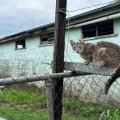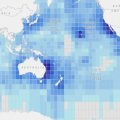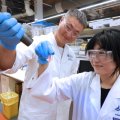A study to identify why prolonged sitting could be fatal is one of 16 prestigious national awards and fellowships granted to health and medical researchers at The University of Queensland (UQ).
Announced by the Australian Government today, the $8.5 million awarded to UQ from the National Health and Medical Research Council (NHMRC) will support UQ health and medical researchers to undertake research that is of major benefit to Australia’s future health.
Included in the announcement today was the award of eight sought-after Research Fellowships to UQ researchers – the third highest number of Research Fellowships awarded to a single organisation nationally in this funding round and valued at $5.7 million in total.
Professor Neville Owen, from UQ’s School of Population Health, was awarded a Senior Principal Research Fellowship to help combat Australia’s growing obesity epidemic by studying why prolonged sitting is unhealthy.
“Australians are ‘sitters’ at home, at work and in the car,” Professor Owen said
“Most do not do exercise, nor participate in sports and this leads to weight gain and risk of diseases such as Type II diabetes, heart disease and breast and colon cancer.”
“Our study will identify why prolonged sitting is so unhealthy and how Australian neighbourhoods, homes, work and cars make us sit too much. We will also look at why some people’s health is more susceptible to ‘couch potato’ lifestyles.”
Deputy Vice-Chancellor (Research), Professor Max Lu said the funding confirmed UQ’s reputation for attracting talented health and medical researchers.
“These results reflect the quality of the awardees and the significant research they conduct. It also highlights that UQ is a first class institution to undertake health and medical research,” Professor Lu said.
“It creates new opportunities for the next generation of health researchers and builds on the great work of UQ to ensure we attract and retain the best and brightest researchers from Australia and internationally.”
UQ’s award and fellowship winners, their schools and projects, announced by the NHMRC today, are;
Training (Post-doctoral) Fellowships
Dr Richard Allen, Institute for Molecular Bioscience, The identification of channel-like transport pathways in the malaria-infected erythrocyte using animal peptide toxins
Dr Bradley Partridge, University of Queensland Centre for Clinical Research, Public attitudes towards using pharmaceuticals for neuroenhancement
Dr Martin Sale, Queensland Brain Institute, Investigation of the effect of prism therapy on attention dysfunction in right-parietal lobe damaged stroke patients with spatial neglect
Career Development Awards
Associate Professor Jonathan Adams, School of Population Health, A Critical Examination of Complementary and Alternative Medicine in Women's Health: A Focus Upon Decision-Making and Communication Regarding Risk and Risk Management
Associate Professor Rosa Alati, School of Population Health, Genes, biology and environment in the development of substance use and mental health disorders
Dr Mathias Francois, Institute for Molecular Bioscience, Lymphangiogenesis from development to disease: Analysis of SOX18 function in the control of lymphatic remodelling
Dr Kylie Tucker, School of Health and Rehabilitation Sciences, Reconsideration of the mechanisms underlying movement changes with pain
Research Fellowships
Professor Paul Hodges, School of Health and Rehabilitation Sciences, Physiology and pathophysiology of disorders of the musculoskelatal system
Professor Bostjan Kobe, School of Chemistry and Molecular Biosciences, Structural biology of infection and immunity
Professor Neville Owen, School of Population Health, The population-health science of sedentary behaviour: an integrated approach to understanding environments, prolonged sitting and adverse health outcomes
Professor Linda Richards, Queensland Brain Institute, Development of the cerebral cortex
Professor Peter Sly, University of Queensland Centre for Clinical Research, Inflammatory airway diseases in children: mechanisms underlying and preventative strategies
Associate Professor Michelle Sterling, Centre of National Research on Disability and Rehabilitation Medicine, Whiplash injury: Mechanisms, prediction and directives for improved management strategies
Professor Jennifer Stow, Institute for Molecular Bioscience, Protein trafficking in inflammation and disease
Dr Matthew Sweet, Institute for Molecular Bioscience, Toll-like receptors and innate immunity: genes and pathways regulating infectious and inflammatory diseases
Practitioner Fellowships
Associate Professor Elizabeth Powell, School of Medicine, The role of obesity, insulin resistance and fatty liver (steatosis) in human disease and strategies to monitor and improve patient outcomes
Media: Kathy Grube at UQ Communications (07 3346 0561 or k.grube@uq.edu.au)
.jpg)









